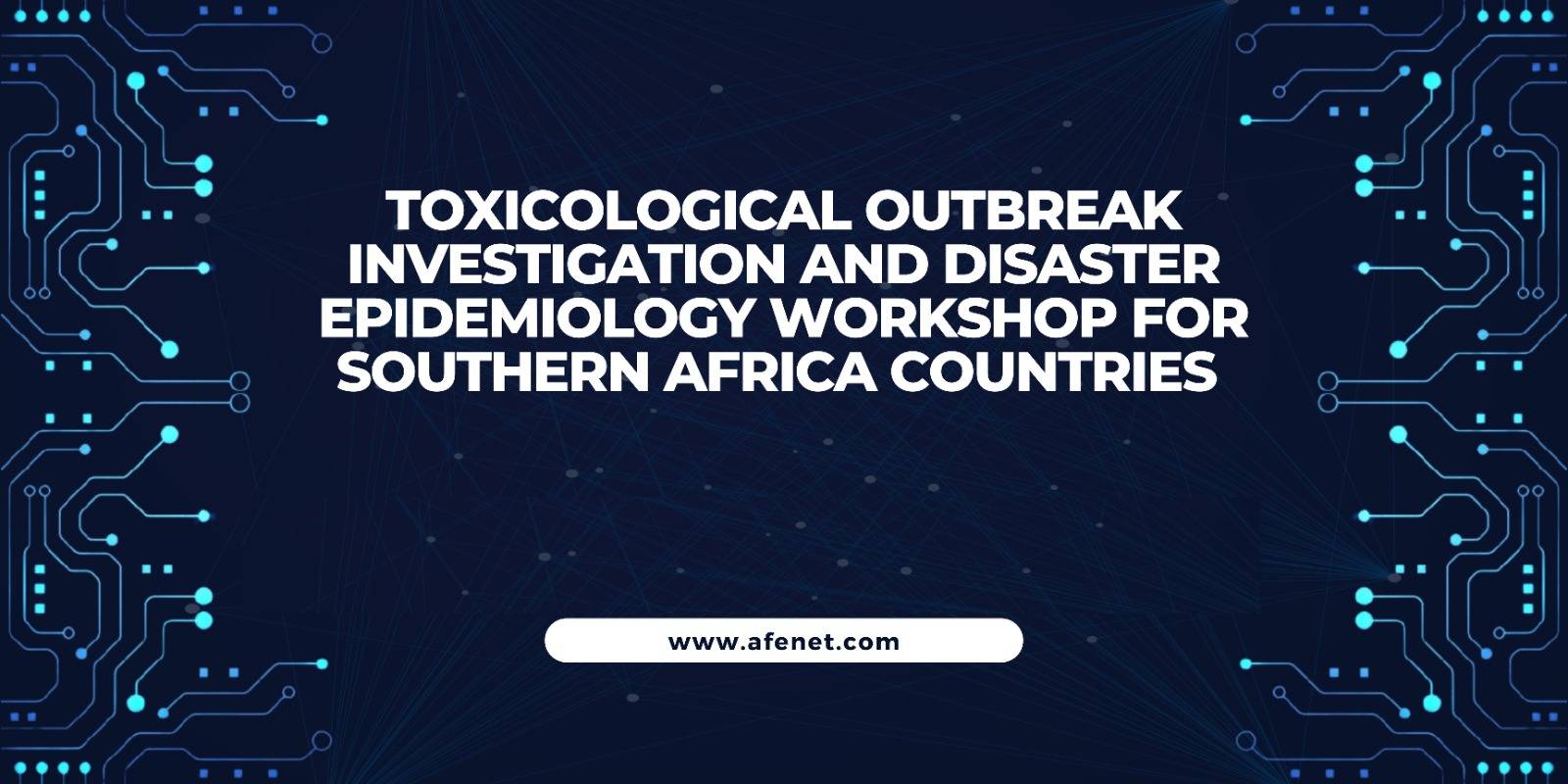
- This event has passed.
Toxicological Outbreak Investigation and Disaster Epidemiology Training/Workshop For Southern Africa
Southern Africa Region Profile
Southern Africa AFENET region is diverse and is known for its rich cultural heritage, varied landscapes, and significant natural resources. Major countries include South Africa, Namibia, Botswana, Zimbabwe, Zambia, Lesotho, Eswatini, Mozambique, Malawi and Angola. The region has a mixed economy with agriculture, mining and tourism as vital sectors. South Africa is the largest economy, known for its mining and manufacturing industries.
Health challenges and natural disasters significantly impact communities in this region. High prevalence rates of HIV/AIDS particularly in countries like South Africa and Botswana continue to strain healthcare systems. The other significant health challenge is that of Tuberculosis (TB). The region has some of the highest TB rates globally, often compounded by HIV co-infection.
Natural disasters pose significant risks to communities and economies in this region. Key types include drought, floods, cyclones, fires and desertification which affects arable land, reducing agricultural productivity and leading to food insecurity. Particularly impacts communities reliant on farming. These disasters require effective disaster preparedness and response strategies to mitigate their impacts on vulnerable populations.
Recently, southern Africa experienced several significant disasters including cyclone Idai (2019) which struck Mozambique, Zimbabwe and Malawi, causing widespread flooding and displacement. It resulted in over 1000 deaths and significant infrastructure damage. Furthermore, prolonged droughts have affected countries like Zimbabwe and South Africa, leading to severe water shortages and food insecurity, particularly in 2019 and 2020. These disasters highlight the region’s vulnerability to climate related events and the need for improved disaster preparedness and resilience strategies.
The CDC’s National Center for Environmental Health, Health Studies Team (HST) mission is to prevent exposure to and disease from non-infectious environmental hazards by building environmental epidemiologic capacity needed for public health action, providing evidence-based information on the potential impact of environmental hazards on human health, and by responding to environmental public health emergencies.
To help public health agencies investigate toxic outbreaks and developing public health workshop for disaster preparedness and response, the HST developed an environmental toxic outbreak investigation and disaster epidemiology trainings. These trainings course is flexible to meet the needs of various audiences both for domestic and international audience.
Course Goal
The goals of the Toxic Outbreak and Disaster Epidemiology Course are to provide information, resources, and learning activities to help public health practitioners, Field Epidemiology Training Program (FETP) fellows gain the knowledge and skills needed to investigate a toxicological outbreak and respond to natural or human-induced disasters.
Target Audience
The target audience includes public health practitioners, FETP fellows, emergency managers who investigate outbreaks, or respond to disasters in Southern Africa region
Course duration
The course duration will vary depending on the modules that are included and the delivery format. The suggested course duration for a facilitator-led delivery of all modules, which allows for group process and discussion, is approximately 7 days. We will do a modified version of the full course (5 days) if there is time or fund limitation
Partner
The training workshop will be organized in partnership with African Field Epidemiology Network (AFENET) Southern Africa Regional Office . Selected public health practitioners and FETP fellows from Angola, Botswana, Mozambique, Zambia, Namibia, Zimbabwe and South Africa will be invited to participate. An additional invited guest from West African region will also participate.
Place and date
To Be Determined
Funding
The funds to cover local costs such as venue, stationaries, and participants travel expenses etc. will be provided by the US CDC through a cooperative agreement with AFENET.
NCEH/HSS Subject Mater Expertise (SMES)
- Three SMEs from NCEH/HST will travel to deliver the training.
- HST will cover the travel expenses of NCEH/HST SMEs
Logistics
- The AFENET, Southern Africa Regional office in liaison with SAFETP will be responsible for fund management, organizing the workshop including securing the venue, inviting the participants, writing the final report etc.
- Course size: 25–30 participants
- A/V equipment needed: computer with PowerPoint©, projector, and screen
- Materials: copies of participant workbook, toolkit, pens, flip chart, and markers

